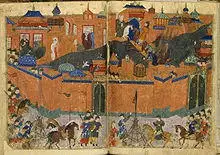| Millennium: | 2nd millennium |
|---|---|
| Centuries: | |
| Decades: | |
| Years: |
|
| Gregorian calendar | 1258 MCCLVIII |
| Ab urbe condita | 2011 |
| Armenian calendar | 707 ԹՎ ՉԷ |
| Assyrian calendar | 6008 |
| Balinese saka calendar | 1179–1180 |
| Bengali calendar | 665 |
| Berber calendar | 2208 |
| English Regnal year | 42 Hen. 3 – 43 Hen. 3 |
| Buddhist calendar | 1802 |
| Burmese calendar | 620 |
| Byzantine calendar | 6766–6767 |
| Chinese calendar | 丁巳年 (Fire Snake) 3954 or 3894 — to — 戊午年 (Earth Horse) 3955 or 3895 |
| Coptic calendar | 974–975 |
| Discordian calendar | 2424 |
| Ethiopian calendar | 1250–1251 |
| Hebrew calendar | 5018–5019 |
| Hindu calendars | |
| - Vikram Samvat | 1314–1315 |
| - Shaka Samvat | 1179–1180 |
| - Kali Yuga | 4358–4359 |
| Holocene calendar | 11258 |
| Igbo calendar | 258–259 |
| Iranian calendar | 636–637 |
| Islamic calendar | 655–656 |
| Japanese calendar | Shōka 2 (正嘉2年) |
| Javanese calendar | 1167–1168 |
| Julian calendar | 1258 MCCLVIII |
| Korean calendar | 3591 |
| Minguo calendar | 654 before ROC 民前654年 |
| Nanakshahi calendar | −210 |
| Thai solar calendar | 1800–1801 |
| Tibetan calendar | 阴火蛇年 (female Fire-Snake) 1384 or 1003 or 231 — to — 阳土马年 (male Earth-Horse) 1385 or 1004 or 232 |
Year 1258 (MCCLVIII) was a common year starting on Tuesday (link will display the full calendar) of the Julian calendar.
Events
By area
Global
- The observed effects of an eruption of the Indonesian volcano Mount Rinjani, in late 1257, include the following anecdotal accounts: dry fog in France; lunar eclipses in England; severe winter in Europe; a "harsh" spring in northern Iceland; famine in England, western Germany, France, and northern Italy; and pestilence in London, parts of France, Austria, Iraq, Syria, and southeast Turkey.[1]
Asia
- February 10 – The Siege of Baghdad ends with a battle, in which Hulagu Khan's Mongol forces overrun Baghdad, then the leading center of Islamic culture and learning, and capital of the Abbasid Caliphate. They burn the imperial city to the ground, killing as many as 1,000,000 citizens, and destroy the House of Wisdom, containing countless precious historical documents, and books on subjects ranging from medicine to astronomy.
- June 25 – War of Saint Sabas: In the Battle of Acre, the Venetians defeat a larger Genoese fleet sailing to relieve Acre.
- The Chinese era Baoyou ends, in the Southern Song Dynasty of China.
- Korea surrenders to the Mongols, ending the effective resistance of the Choe faction within Korea.
- The Mongol Empire invades the Đại Việt (present-day northern Vietnam). The Mongol army is soon defeated by the Đại Việt forces.
Europe
- May 11 – The Treaty of Corbeil is signed between James I of Aragon and Louis IX of France. The French king, as the heir of Charlemagne, formally renounces his feudal overlordship over Catalonia (independent de facto since 988), while the Aragonese king renounces his claims over Occitania.
- August 25 – George Mouzalon, regent of the Empire of Nicaea, is assassinated in Magnesia ad Sipylum, as part of a conspiracy led by nobles, under future emperor Michael VIII Palaiologos.
- Llywelyn ap Gruffudd declares himself Prince of Wales. He is the final ruler of an independent Wales, before its conquest by the English.
- King Henry III of England is forced by seven powerful barons to accept the Provisions of Oxford.
- Gissur Þorvaldsson is made Earl of Iceland, by King Haakon IV of Norway.
- The Mongol Golden Horde attacks Lithuania.
- The Battle of Karydi ends the War of the Euboeote Succession in a crushing victory for William II of Villehardouin, Prince of Achaea.
- Epirote–Nicaean conflict.
By topic
Markets
- In Genoa, the Republic starts imposing forced loans, known as luoghi, to its taxpayers; they are a common resource of medieval public finance.[2]
Religion
- Civil unrest in northern Italy spawns the medieval musical form of Geisslerlieder, penitential songs sung by wandering bands of Flagellants.
- The Mongols murder the Abbasid Caliph, and end the long-standing Islamic Empire.
Births
- Osman I, founder of the Ottoman Empire (d. 1326)
- Trần Nhân Tông, emperor of Vietnam (d. 1308)
- Lady Nijō, Japanese concubine and Buddhist nun
- probable
- Arghun, fourth Ilkhanate ruler of Iran (d. 1291)
- Henryk IV Probus, Duke of Wrocław (d. 1290)
Deaths
- February – Sulaiman Shah, Abbasid soldier
- February 20 – Al-Musta'sim, last Abbasid Caliph of Baghdad
- April 5 – Saint Juliana of Liège
- June 2 – Peter I, Count of Urgell
- July 22 – Meinhard I, Count of Gorizia-Tyrol (b. c. 1200) (alternative date is February)
- August 18 – Theodore II Laskaris, emperor of Nicea (Byzantine emperor in exile)
- August 25 – George Mouzalon, regent of the Empire of Nicaea
- November 10 – William de Bondington, Bishop of Glasgow
- Abul Hasan ash-Shadhili, Moroccan spiritual leader (b. 1175)
- Clement of Dunblane, first Dominican bishop in Britain
- Hong Bok-won, Goryeo commander who later served the Mongol Empire
- Ingerd Jakobsdatter, Danish countess (b. 1200)
